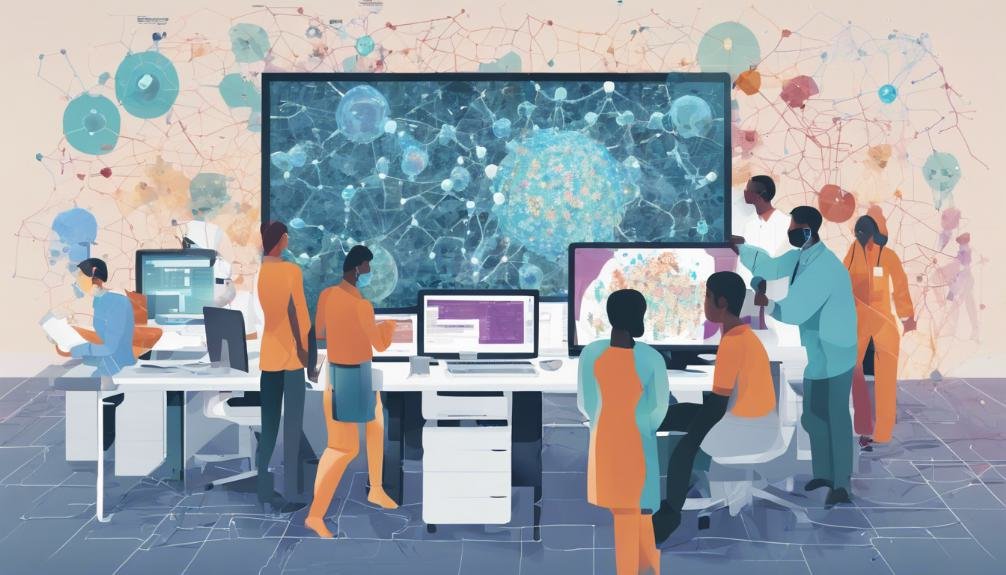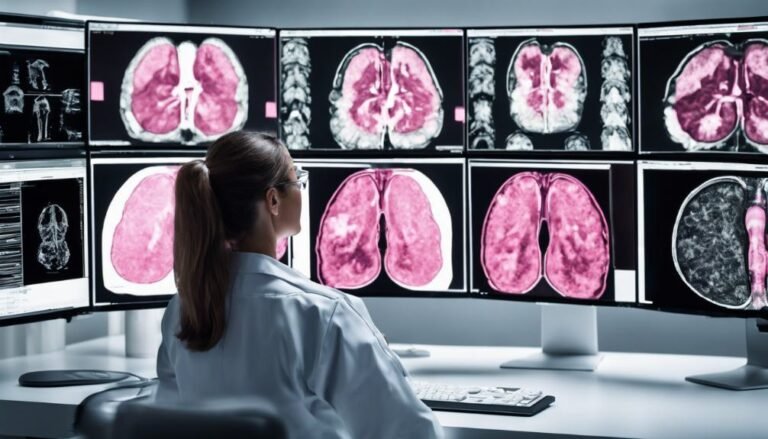AI in Public Health Research
In the field of public health research, the integration of AI has sparked a paradigm shift in the way we address health concerns. Imagine a scenario where data-driven insights can revolutionize disease prevention strategies and optimize resource allocation. The potential of AI goes beyond mere data analysis; it holds the key to discovering new avenues for proactive health management. As we explore further into the impact of AI on public health, intriguing questions arise about its implications for policy-making and community well-being.
Key Takeaways
- AI enhances disease surveillance through real-time data analysis.
- Predictive modeling in AI identifies patterns signaling outbreaks.
- AI monitors diverse data sources for early health threat detection.
- Data integration from sources like electronic health records provides holistic population health insights.
- AI facilitates quicker outbreak response by monitoring changes in disease patterns.
The Role of AI in Public Health
How does artificial intelligence revolutionize public health research and practice?
AI plays a vital role in transforming public health through predictive modeling, improved diagnostics, preventive interventions, and data integration.
Predictive modeling in AI enables researchers to forecast disease outbreaks, identify at-risk populations, and allocate resources efficiently.
By utilizing vast datasets, AI can enhance diagnostic accuracy by analyzing symptoms, genetic markers, and medical imaging results, leading to early disease detection and personalized treatment plans.
Additionally, AI-driven preventive interventions help public health officials design targeted strategies for disease prevention and health promotion based on individual risk factors and behavior patterns.
Data integration facilitated by AI allows for the seamless aggregation and analysis of diverse health data sources, such as electronic health records and environmental factors, enabling thorough insights into population health trends.
To conclude, AI empowers public health research and practice by offering advanced tools for prediction, diagnosis, prevention, and data utilization, ultimately improving public health outcomes.
Applications of AI in Disease Surveillance
Artificial intelligence enhances disease surveillance by enabling real-time data analysis and early detection of potential health threats. Through predictive modeling, AI can analyze vast amounts of healthcare data in real-time, identifying patterns and trends that may signal an outbreak. This capability allows public health authorities to swiftly respond to emerging threats, implementing preventive measures promptly.
AI's vital monitoring capabilities play an essential role in disease surveillance by continuously collecting and analyzing data from various sources. By integrating data from sources such as electronic health records, social media, and wearable devices, AI systems can provide a holistic view of population health status. This data integration enables health professionals to monitor changes in disease patterns more effectively, enabling quicker outbreak detection and response.
AI's Impact on Healthcare Data Analysis
Through its advanced algorithms and processing capabilities, AI revolutionizes healthcare data analysis by swiftly revealing insights from complex datasets to enhance decision-making and improve patient outcomes. AI excels in data interpretation, allowing for the extraction of valuable information from vast amounts of healthcare data.
By utilizing predictive modeling techniques, AI can forecast trends, identify potential risks, and personalize treatment plans based on individual patient data. This leads to more precise diagnoses, proactive interventions, and optimized healthcare delivery.
AI's impact on healthcare data analysis is profound, enabling researchers and healthcare providers to streamline processes, identify patterns that may not be apparent to human analysts, and make data-driven decisions with a higher degree of accuracy. With AI's ability to handle large volumes of data efficiently, it greatly enhances the speed and accuracy of data processing, ultimately leading to improved patient care and outcomes.
Challenges and Ethical Considerations
Managing the integration of AI in public health research poses significant challenges and ethical considerations that require careful consideration and proactive management. Privacy concerns and data security are paramount when utilizing AI in public health research. The vast amount of sensitive health data being processed raises questions about who's access to this information and how it's being protected. Ensuring robust data security measures and adhering to strict privacy protocols are essential to maintain trust and safeguard individuals' confidential information.
Moreover, bias detection and algorithm transparency are critical aspects that need to be addressed when implementing AI in public health research. Detecting and mitigating biases in the data used to train AI models is vital to prevent discriminatory outcomes. Additionally, ensuring transparency in the algorithms' decision-making processes is essential for researchers and stakeholders to understand how conclusions are drawn.
Future Trends in AI-driven Research
Exploring emerging trends in AI-driven research reveals the potential for transformative advancements in public health investigations. AI innovation, particularly in predictive modeling, is poised to revolutionize the way public health interventions are designed and implemented. By harnessing the power of AI algorithms, researchers can analyze vast amounts of data to reveal disease outbreaks, identify high-risk populations, and optimize resource allocation for maximum impact.
One key trend on the horizon is the seamless integration of technology into public health systems. AI-driven tools can streamline data collection, analysis, and dissemination, enabling real-time monitoring of health trends and early detection of potential threats. This integration not only enhances the efficiency of public health initiatives but also facilitates evidence-based decision-making for policymakers and healthcare professionals.
As AI continues to evolve, the future of public health research holds great promise. By embracing AI innovation and predictive modeling, researchers can uncover new insights, improve intervention strategies, and ultimately enhance the health and well-being of communities worldwide.
Conclusion
To wrap up, AI in public health research is transforming the way we approach health challenges, from predicting disease outbreaks to enhancing diagnostic accuracy.
As technology continues to advance, the potential for AI to improve population health outcomes is limitless.
Embracing AI-driven research is essential for staying at the forefront of evidence-based decision-making in public health.
So, why hesitate? Engage in the world of AI and unleash the power of data-driven solutions for a healthier future.







